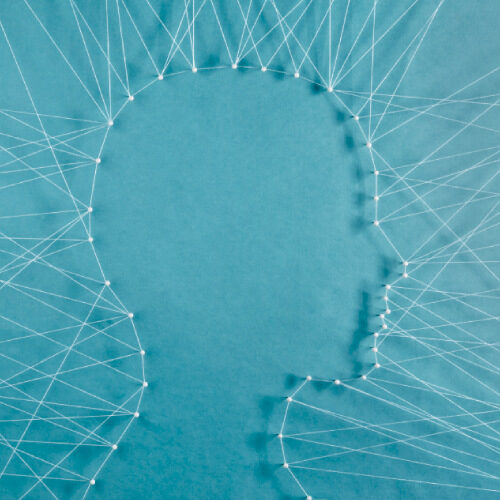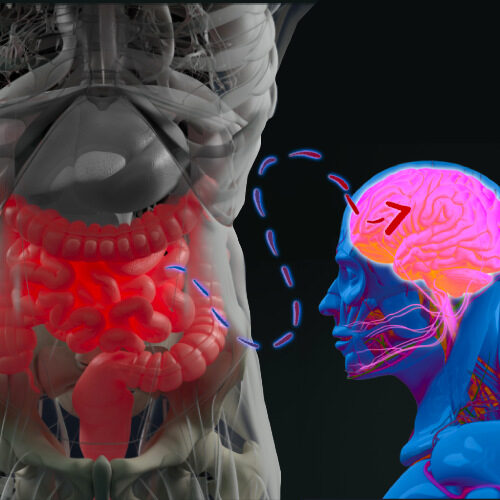Integrative Mental Health In San Diego

Why Are Mental Health Issues Rising?
Mental health issues have become more commonplace in the United States, with various contributing factors such as the Standard American Diet (SAD), chronic stressors, lack of physical activity and nature exposure, social alienation, and excessive digital and social media use.
Our brains are not used to the rapid changes our modern society has seen and unfortunately, many people are struggling to cope.
Yet there is hope; by modifying elements that we can control, mental health conditions can be improved significantly.


Factors contributing to increasing rates of mental health issues:
- Poor diet
- Digestive dysfunction
- Lack of exercise
- Toxins in environment and food
- Physical and emotional trauma
- Chronic stress
- Overuse of social media
- Overuse of electronic devices
- Lack of time spent in nature
Connection Between Gut Health and Mental Health
A strong connection exists between the health of our gut and our mental wellbeing. Evidence continues to mount that shows how crucial gut health is for maintaining good mental health. Factors such as diet, microbiome diversity, inflammation levels, gut permeability, and infection presence all influence one another and can drastically affect our mental health in either positive or negative ways.
The often-referenced “brain-gut (or gut-brain) axis” describes the connection between the brain and gut, which is primarily established through the vagus nerve.
Moreover, our mental health is greatly influenced by the bacterial content of our gut microbiome; these bacteria are key players in neurotransmitter production which can have a profound impact on our mental wellbeing.
Mental health professionals often neglect to factor in the importance of gut health, but if root causes and the state of a person’s GI system are left unaddressed then it is unlikely that true mental wellbeing can be achieved.
Conditions we treat:
- Anxiety
- OCD
- Depression
- ADHD
- Social Anxiety
- PTSD
- Autism Spectrum Disorder (ASD)

Integrative mental health perspective
At our clinic, we understand that the individualized nature of mental health requires a specialized approach. We investigate and address root causes through thorough patient history-taking combined with specific testing such as neurotransmitter, hormone, gut, genetic, and micronutrient testing in order to come up with the best course of action.

Our doctors are highly qualified in caring for those suffering from mental health issues and we promise that you can start to feel better.
Integrative mental health treatment strategies:
- Optimizing gut health and the microbiome. Many of our neurotransmitters, especially serotonin, are largely produced in the digestive system. The bacteria in the gut also have an influence on dopamine, serotonin, norepinephrine, and GABA production. Moreover, the nutrients that are absorbed from the GI tract are essential for proper neurotransmitter creation.
- Lowering inflammation plays a huge role in improving almost any mental health condition such as anxiety, depression, or ADHD. Inflammation is quite pervasive, caused by factors such as stress, prior concussion, environmental toxicity, and diet. It also triggers microglia activation – cells in the brain that can lead to additional mental health issues when overly active.
- Optimizing neurotransmitters. Mental health is strongly intertwined with neurotransmitters such as dopamine, serotonin, GABA, and acetylcholine.
- Balancing hormones. Hormones like testosterone, estrogen, and progesterone are closely linked to neurotransmitters such as dopamine and GABA in the brain. When these hormones become unbalanced, it can lead to disruption of the neurotransmitter levels as well.
- Optimizing Omega 3 Index. Western diets tend to be high in omega 6 fats, which often have inflammatory properties. However, omega 3 fats are anti-inflammatory and can support the repair and growth of neural tissue.
- Lifestyle interventions like meditation, mindfulness, or yoga.
- Improving adrenal health. Prolonged stress and excessive cortisol releases can lead to adrenal fatigue, reducing sex hormone production and amplifying mental health issues.
- Optimizing exercise and physical activity – exercise plays a critical role in the production of mood improving endorphins, also known as “happy chemicals”.
- Optimizing methylation and B vitamin status (ie. MTHFR, MAO, COMT). Methylation plays a large role in the production and breakdown of key neurotransmitters that play an important role in mental health.
- Optimizing key amino acids from the diet for neurotransmitter support. Ingesting adequate levels of tryptophan aids in boosting serotonin, the hormone which affects mood and wellbeing. Tyrosine is derived from phenylalanine and can help to improve mood when struggling with depression. Ensuring these and other key amino acids are present in your diet is essential for optimal mental health.
The Journey To Better Mental Health Is A Personal One

The alarming rise in mental health issues in today’s society is a complex issue that can be traced back to a myriad of contributing factors.
These range from inadequate diets and a lack of physical activity to chronic stress, environmental toxins, and an over-reliance on digital technology.
However, it’s crucial to remember that there is always hope for improvement. With a comprehensive understanding of these factors, we can take control and make significant progress towards better mental health.
The journey to better mental health is a personal one, and we’re here to guide you every step of the way. If you’re suffering from a mental health disorder or are simply looking to improve your overall mental wellbeing, we invite you to take the first step towards healing.
Book a discovery call with us today, or call 858-201-3171. Let’s work together to devise a personalized treatment plan that best fits your unique needs and paves the way for a healthier, happier future.
